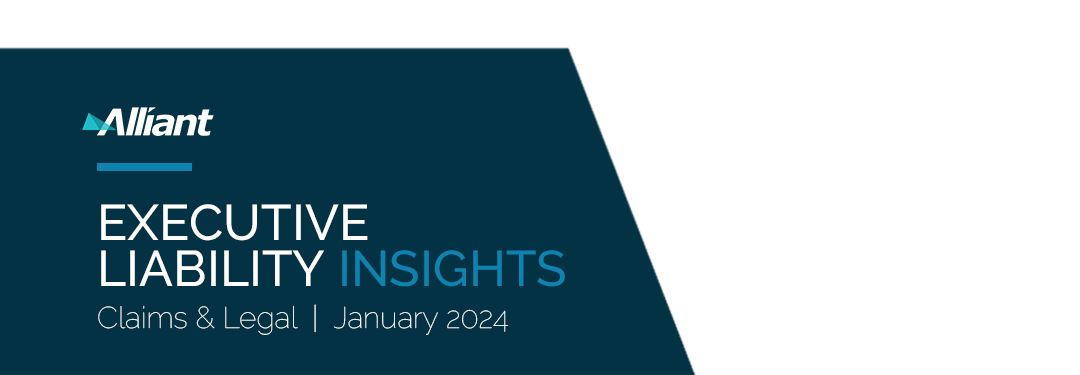
Navigating today’s complex risk environment can be a monumental task. Steve Shappell, Alliant Claims & Legal, spearheads Executive Liability Insights, a monthly review of news, legal developments and information on executive liability, cyber risk, employment practices liability, class action trends and more.


FEATURED ARTICLE
THE DEFINITION OF A SECURITIES CLAIM, NOT ALWAYS EASY TO KNOW
In re Fairpoint Insurance Coverage Appeals, C.A. No. N18C-08-086, 2023 Del. LEXIS 421 (Del. Supr. Dec. 15, 2023).
A complex three-party transaction, in which a telecommunications company spun-off certain assets, spawned insurance coverage litigation revolving around the definition of a Securities Claim.
In This Issue:
COURT OF CHANCERY DISMISSES DERIVATIVE COMPLAINT FOR FAILURE TO PLEAD DEMAND FUTILITY
Joel Newman v KKR Phorm Investors, L.P. et al., C.A. No. 2022-0310-NAC (Del. Ch. Aug 31, 2023).
An individual shareholder (the “Individual”) of a publicly traded semiconductor company filed a derivative action against the company’s Board of Directors (the “Board”) and the company’s largest shareholder (“the Shareholder”) arising from a “Private Placement” approved by the organization’s Audit Committee.
Read More >>
THE INTERPLAY OF RELATED CLAIMS AND PRIOR NOTICE EXCLUSION
Aaron v. Ill. Nat'l Ins. Co., 2023 U.S. Dist. LEXIS 200444 (E.D.La. Nov 8, 2023).
In what has become one of the most dominant issues in financial lines coverage disputes, this case once again addresses relatedness. Following one of the largest bank failures in Louisiana, the bank expectedly started to drown in legal actions and, after its collapse, secured a victory against its directors and officers Insurance Carrier (the “Carrier”) over the interpretation of “related” language.
Read More >>
ONEROUS PLEADING BURDEN IMPOSED FOR A CAREMARK BREACH OF FIDUCIARY DUTY CLAIM AGAINST AN OFFICER
Segway Inc. v. Hong Cai, 2023 Del. Ch. LEXIS 643 (Del. Ch. Dec. 14, 2023).
Recently, in a seminal and high-profile decision, a Delaware Vice-Chancellor held that corporate officers can be sued for breach of duty of oversight. Previously, it was understood that only directors could be held responsible for such Caremark claims.
Read More >>
WHEN DOES A CIVIL INVESTIGATION DEMAND BECOME A CLAIM TO ALLOW DEFENSE COSTS TO ERODE THE RETENTION
NWHW Holdings, Inc. v. Nat’l Union Fire Ins. Co. of Pittsburgh, P.A., No. 22-01030-CJC (C.D. Cal. Dec. 22, 2023).
In the underlying case, a Learning Institution (the “Institution”) alleged that its D&O Carrier breached its obligations under the policy when the Carrier denied coverage for defense costs related to a False Claims Act (“FCA”) investigation.
Read More >>
AN INDICTMENT NOT DEMANDING RELIEF IS NOT A “CLAIM” UNDER A PROFESSIONAL LIABILITY POLICY
Schulman v. Axis Surplus Ins. Co., 2024 WL 41214 (4th Cir. Jan. 4, 2024).
In the underlying case, a grand jury issued a subpoena and subsequent indictment against a law firm (the “Firm”) that charged the Firm with conspiracy, money laundering, and forfeiture in connection with the Firm’s representation regarding recovery of frozen assets.
Read More >>
CYBER CORNER
Click to read the following cases:
- DATA BREACH INVESTIGATION REPORTS MAY NOT ALWAYS BE PRIVILEGED
- CREDENTIAL STUFFING LEADS TO DIRECT AND INDIRECT DATA BREACHES
Read More >>
EMPLOYMENT CORNER
Click to read the following cases:
- NEW YORK CITY LAW PROTECTING FAST FOOD WORKERS IS NOT PREEMPTED BY THE NATIONAL RELATIONS ACT
Read More >>
SECURITIES CORNER
Click to read the following cases:
- A GENERALIZED LETTER FROM THE SEC ADDRESSED ONLY TO THE COMPANY IS NOT A CLAIM AGAINST INSURED PERSONS
- SEC APPROVED EXCHANGE-TRADED PRODUCTS HOLDING BITCOIN
- DECEMBER 2023 NOTEWORTHY ENFORCEMENT ACTIONS FILED
- DECEMBER 2023 NOTEWORTHY SETTLEMENTS AND JUDGEMENTS
Read More >>
SHAREHOLDER CORNER
Click to read the following cases:
- DECEMBER 2023 SECURITIES CLASS ACTION FILINGS
Read More >>
THE DEFINITION OF A SECURITIES CLAIM, NOT ALWAYS EASY TO KNOW
In re Fairpoint Insurance Coverage Appeals, C.A. No. N18C-08-086, 2023 Del. LEXIS 421 (Del. Supr. Dec. 15, 2023).


A complex three-party transaction, in which a telecommunications company spun off certain assets, spawned insurance coverage litigation revolving around the definition of a Securities Claim. Following the transaction, the spinoff company declared bankruptcy and the Trustee filed an action (the “underlying action”) against the parent company to avoid alleged fraudulent transfers connected to the spinoff.
The insurer issued two D&O insurance policies; one to the parent company and one was a separate transaction-specific policy. The parent company sought coverage under both policies for the underlying settlement and defense costs. The insurer denied coverage because the matter did not meet the definition of a Securities Claim in either policy.
The relevant definition of a Securities Claim in each policy included those Claims “brought derivatively on behalf of an Organization by a security holder of such Organization.” The parent company argued the Trustee was a “security holder” within the meaning of the Bankruptcy Code. Further, the underlying action was brought derivatively because the claims arose prior to the bankruptcy and sought damages for the benefit of the debtor’s estate. The lower court held that the post-bankruptcy litigation for fraudulent transfer claims was derivative and therefore qualified as a Securities Claim under the policies. The insurers appealed.
On appeal, the court reversed and sided with the insurers who denied coverage. The appellate court found that the fraudulent transfer claims were direct action claims and not derivative in nature because the creditors suffered direct harm caused by the transfer and the remedy sought was for their direct benefit. In reaching its decision, the court determined that the Trustee was not standing in the shoes of shareholders and thus the Claim did not qualify as a Securities Claim.
COURT OF CHANCERY DISMISSES DERIVATIVE COMPLAINT FOR FAILURE TO PLEAD DEMAND FUTILITY
Joel Newman v KKR Phorm Investors, L.P. et al., C.A. No. 2022-0310-NAC (Del. Ch. Aug 31, 2023).


An individual shareholder (the “Individual”) of a publicly traded semiconductor company filed a derivative action against the company’s Board of Directors (the “Board”) and the company’s largest shareholder (“the Shareholder”) arising from a “Private Placement” approved by the organization’s Audit Committee. The Individual alleged that the Shareholder, a private equity company, breached their fiduciary duties by participating in the equity issuance and further, that the Board breached their fiduciary duties by approving the Private Placement. The Individual filed the derivative action without first making the requisite demand on the Board to investigate potential wrongdoing. Instead, the Individual relied on documents obtained by way of production they received in connection with their initial Section 220 Books and Records demand.
The Shareholder and Board filed a Motion to Dismiss and argued that the Individual failed to plead that a prior demand on the Board would have been ineffective, i.e. “Demand Futility.” Specifically, the Shareholder and the Board argued that the Individual failed to allege any particular facts that would demonstrate the directors lacked independence to properly address the proposed Private Placement.
The court agreed with the Shareholder and the Board and dismissed the case. The court noted that the derivative action did nothing to rebut the presumption of the directors’ independence and further, that the Individual did not sufficiently plead that the Audit Committee lacked independence from the Shareholder. Finally, the court found that the Individual failed to adequately allege the Shareholder and the Board acted in bad faith.
THE INTERPLAY OF RELATED CLAIMS AND PRIOR NOTICE EXCLUSION
Aaron v. Ill. Nat'l Ins. Co., 2023 U.S. Dist. LEXIS 200444 (E.D.La. Nov 8, 2023).


In what has become one of the most dominant issues in financial lines coverage disputes, this case once again addresses relatedness. Following one of the largest bank failures in Louisiana, the bank expectedly started to drown in legal actions and, after its collapse, secured a victory against its directors and officers Insurance Carrier (the “Carrier”) over the interpretation of “related” language.
After its collapse, the bank sought coverage from the Carrier for claims made against its executives alleging that they breached their fiduciary duty and were grossly negligent in approving various loans. The Carrier denied coverage, arguing that the new claims related back to claims that were tendered to the Carrier for the previous policy period and, therefore, they were barred from coverage by the prior notice exclusion. The Insured launched a coverage litigation.
The “Interrelationship of Claims” section of the policy provided:
All Claims alleging, arising out of, based upon or attributable to the same facts, circumstances, situations, transactions, or events or to a series of related facts, circumstances, situations, transactions or events will be considered to be a single Claim and will be considered to have been made at the time the earliest such Claim was made.
According to the Insurer, the “all Claims alleging, arising out of, based upon or attributable to . . .” language in the exclusion had to be interpreted broadly, requiring “mere connection” to the formerly noticed claims. The court disagreed, focusing on the state law which demanded a stronger causal link. According to the court, the Carrier failed to show that the new claims involving allegations of breaches of fiduciary duties and violations of securities laws were related to the prior claims factually only because they concerned the same bank. Similarly, the court clarified that one of the prior notices constituted a notice of potential claims which could not trigger the prior notice exclusion. The court also held that the two shareholder actions were unrelated because there was no showing of relatedness with the specific lending relationships. As a result, the court granted the bank’s partial summary judgment.
ONEROUS PLEADING BURDEN IMPOSED FOR A CAREMARK BREACH OF FIDUCIARY DUTY CLAIM AGAINST AN OFFICER
Segway Inc. v. Hong Cai, 2023 Del. Ch. LEXIS 643 (Del. Ch. Dec. 14, 2023).
Recently, in a seminal and high-profile decision, a Delaware Vice-Chancellor held that corporate officers can be sued for breach of duty of oversight. Previously, it was understood that only directors could be held responsible for such Caremark claims.


In a subsequent decision on the merits of a claim brought against a corporate officer, this court clarified the onerous pleading requirements which must be met to proceed with a breach of duty of oversight lawsuit against an officer.
In the underlying case, a manufacturer of transportation devices (the “Company”) sued its former officer, the Vice President of Finance, for breach of fiduciary duty. The Company alleged that the officer knew or should have known of potential issues related to a drastic rise in accounts receivable. According to the Company, the officer knew about the decline in sales of its devices and the rise of accounts receivable and further, the officer ignored the issue and failed to advise the board.
The court noted that the bar to plead such allegations was high and perceiving a lower bar to apply to claims brought against an officer, as opposed to a director, was a “distressing reading of our law” on the part of the Company. The court stated that bad faith continues to be a necessary predicate for such a claim against an officer, thus, the Company needed to allege that the officer (1) “utterly fail[ed] to implement any reporting or information system or controls,” or (2) “having implemented such a system or controls, consciously fail[ed] to monitor or oversee its operations.”
The court dismissed the Company’s Caremark claims against the officer. In doing so, the court hinted that a plausible complaint against the officer would contain factual allegations showing that the officer was culpable for overlooking accounting improprieties, fraudulent business practices, or other material legal violations.
WHEN DOES A CIVIL INVESTIGATION DEMAND BECOME A CLAIM TO ALLOW DEFENSE COSTS TO ERODE THE RETENTION
NWHW Holdings, Inc. v. Nat’l Union Fire Ins. Co. of Pittsburgh, P.A., No. 22-01030-CJC (C.D. Cal. Dec. 22, 2023).


In the underlying case, a Learning Institution (the “Institution”) alleged that its D&O Carrier breached its obligations under the policy when the Carrier denied coverage for defense costs related to a False Claims Act (“FCA”) investigation. The Institution earns revenue by charging each franchisee royalties while providing management and support services to the franchisees who are eligible for the veteran assistance program (the “VA Program”).
The Government served the Institution with a civil investigative demand (CID) requesting documents and testimony. Through the CID, the FCA investigation was looking to clarify whether the Institution had submitted false claims to the VA Program for veteran students’ tuition. After receiving the initial CID, the Institution sought coverage from its D&O Carrier. The Carrier denied coverage because the CID did not constitute a “Claim.”
Eventually, one of the Institution’s franchisees settled with the Government and pointed to the Institution as a wrongdoer in its settlement agreement. This confirmed that the Institute was the “target” of the CID investigation. A year later, the Government presented a PowerPoint presentation (the “Presentation”) to the Institution, highlighting the “scheme” which alleged that the Institution had advised its franchisees on how to violate the VA Program’s payments. According to the allegations, the Institution knowingly collected royalties that were inflated due to the franchisees’ false claims. The Presentation concluded with the Government alleging that the Institution had received millions in royalties through payments by the VA Program. Consequently, the Government proposed a large settlement and demanded that the Institution enter into a tolling agreement.
The Institution again sought coverage, yet the Carrier maintained its denial—this time taking the position that there was a valid Claim, but coverage was limited by the Government Funding Endorsement (the “Endorsement”). Ultimately, the Institution filed a complaint against the Carrier alleging that the Carrier breached the insurance contract and denied coverage in bad faith.
The parties disagreed on when the CID gave rise to a claim. The Institution argued that the CID became a “Claim” when the settling franchisee confirmed that the Institution was the “target” of the investigation. The Carrier, in turn, argued that the CID became a claim following the Presentation. The court agreed with the Carrier, stating that “a false claims CID is, at its essence a subpoena issued by an administrative agency” and that not every investigation must lead to the filing of the claim. Thus, only defense costs incurred after the Presentation should be applied toward the retention.
The Endorsement stated that “‘[l]oss . . . shall also not include the return of funds which were received from any federal, state or local government agency’ but the ‘policy shall pay Defense Costs ‘for’ Claims . . . arising out of the return or request to return such funds[.]’” The court stated that the Endorsement applied because the claim arose out of the Government’s request for the return of funds attributable to false claims for the VA Program’s funding. Since the defense costs incurred by the Institution after the presentation were lower than the deductible, the court held that the Carrier had no coverage obligations under that policy and thus did not act in bad faith.
AN INDICTMENT NOT DEMANDING RELIEF IS NOT A “CLAIM” UNDER A PROFESSIONAL LIABILITY POLICY
Schulman v. Axis Surplus Ins. Co., 2024 WL 41214 (4th Cir. Jan. 4, 2024).


In the underlying case, a grand jury issued a subpoena and subsequent indictment against a law firm (the “Firm”) that charged the Firm with conspiracy, money laundering, and forfeiture in connection with the Firm’s representation regarding the recovery of frozen assets. The Firm sought coverage from its Professional Liability Carrier (the “Carrier”) for the subpoena and indictment; however, the Carrier denied coverage for them because the subpoena did not constitute a “Claim.”
In the ensuing coverage litigation, the underlying courts determined that the indictment did not constitute a “Claim” as defined by the policy. Courts have also explained that a compromise to provide partial coverage for subpoenas preceding the indictment did not obligate the Carriers to provide coverage for the indictment itself, too. The high-positioned federal court agreed with lower courts and noted that a “Claim,” in relevant part, was defined as a “written demand against any Insured for monetary or non-monetary relief.” Thus, under the plain meaning of the word “demand,” a "Claim” must request something from the Firm.
The Firm attempted to argue that other jurisdictions treated subpoenas as demands for relief and, thus, the subpoena should be deemed a “claim” under the policy. However, the court disagreed stating that, unlike a subpoena, the forfeiture sought by the indictment required no action to comply with the allegations, but rather it informed the Firm of an action that might take place in the future. Moreover, the court determined that “while a forfeiture allegation in an indictment [was] a prerequisite to an order of forfeiture, it [did] not necessarily provide notice of the property to be forfeited and therefore [did] not serve the specific notice-providing function of a demand.”
Cyber Corner
DATA BREACH INVESTIGATION REPORTS MAY NOT ALWAYS BE PRIVILEGED
In a recent decision, a federal court in Washington state ordered a hospitality chain (“the Company”) to turn over an investigation report created in response to a ransomware attack (“the attack”). The court ruled that the information in the investigation report did not qualify as protected material under the attorney-client privilege or work product doctrines.
CREDENTIAL STUFFING LEADS TO DIRECT AND INDIRECT DATA BREACHES
One of the leading DNA registries in the country (the “Site”) is facing a flurry of class action lawsuits stemming from a massive data breach in which hackers successfully hacked around 14,000 user accounts using credential stuffing. Credential stuffing is defined as brute-forcing into accounts with passwords that were known to be associated with the targeted customers.
Employment Corner
NEW YORK CITY LAW PROTECTING FAST FOOD WORKERS IS NOT PREEMPTED BY THE NATIONAL RELATIONS ACT
Rest. L. Ctr. v. City of New York, 2024 U.S. App. LEXIS 338 (2d Cir. 2024).
Recently, in a big win for fast food workers in the state of New York, a federal district court held that New York’s Wrongful Discharge Law (the “Law”) was not preempted by the National Relations Act (“NLRA”).
Securities Corner
A GENERALIZED LETTER FROM THE SEC ADDRESSED ONLY TO THE COMPANY IS NOT A CLAIM AGAINST INSURED PERSONS
Hertz Global Holdings, Inc. v. Alterra Am. Ins. Co., 2023 WL 8716803 (Del. Super. Ct. Dec. 18, 2023).
A Delaware Court held that the Insured could not relitigate whether an SEC investigation constituted a Securities Claim against an Insured following an earlier holding by a New York court in a suit the Insured filed against its Insurers.
SEC APPROVED EXCHANGE-TRADED PRODUCTS HOLDING BITCOIN
Recently, the SEC approved 11 exchange-traded products (ETP) holding bitcoin in a highly anticipated decision. The industry advocates hoped the decision would lead to more widespread adoption of ETP, crypto's biggest asset. The SEC approved the 19b-4 form’s requests to list the products from the Nasdaq Stock Market, CboeBZX Exchange, and NYSE Arca.
|
Director/Officer |
Role |
Company |
|
Raymond J. Pirrello |
Founder |
Prior 2 IPO Inc. |
|
David Gentile |
CEO |
GPB Capital Holdings, LLC |
|
Henry Abdo |
Founder |
Titanium Capital LLC |
|
Mmobuosi Odoqwu Banye |
Founder/ Former CEO |
Tingo Group Inc. |
|
Director/Officer |
Role |
Company |
|
Raymond J. Pirrello |
Founder |
Prior 2 IPO Inc. |
|
David Gentile |
CEO |
GPB Capital Holdings, LLC |
|
Henry Abdo |
Founder |
Titanium Capital LLC |
|
Mmobuosi Odoqwu Banye |
Founder, Former CEO |
Tingo Group Inc. |
DECEMBER 2023 NOTEWORTHY SETTLEMENTS AND JUDGMENTS
|
Amount |
Director/Officer |
Role |
Company |
|
$2,218,599 |
Marc Wexler |
Director |
CodeSmart Holdings, Inc. |
|
Amount |
Director/Officer |
Role |
Company |
|
$2,218,599 |
Marc Wexler |
Director |
CodeSmart Holdings, Inc. |
Source: U.S. Securities and Exchange Commission
https://www.sec.gov/litigation/admin.htm
Source: Stanford Law School Securities Class Action Clearinghouse
ABOUT ALLIANT INSURANCE SERVICES
Alliant Insurance Services is the nation’s leading specialty broker. In the face of increasing complexity, our approach is simple: hire the best people and invest extensively in the industries and clients we serve. We operate through national platforms to all specialties. We draw upon our resources from across the country, regardless of where the resource is located.
Contributors


Abbe Darr, Esq.
Claims Attorney
abbe.darr@alliant.com
David Finz, Esq.
Claims Attorney
david.finz@alliant.com
Isabel Arustamyan, Esq.
Claims Attorney
isabel.arustamyan@alliant.com
Jacqueline Vinar, Esq.
Claims Attorney
jacqueline.vinar@alliant.com
Jaimi Berliner, Esq.
Claims Attorney
jaimi.berliner@alliant.com
Karina Montoya, J.D.
Claims Advocate
karina.montoya@alliant.com
Malia Shappell, Esq.
Claims Attorney
malia.shappell@alliant.com
Michael Radak, Esq.
Claims Attorney
michael.radak@alliant.com
Peter Kelly, Esq.
Claims Attorney
peter.kelly@alliant.com
Robert Aratingi
Senior Claims Advocate
robert.aratingi@alliant.com
Steve Levine, Esq.
Claims Attorney
slevine@alliant.com